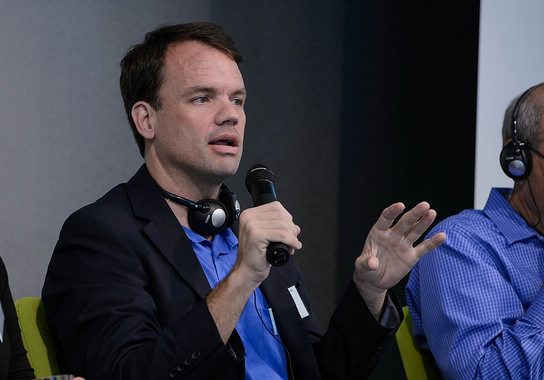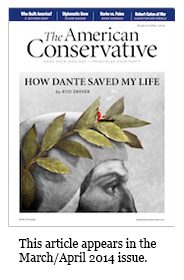The Anti-Warrior

Amid the rubble of our cratered economy, the Bureau of Labor Statistics points to at least one verdant pasture of high-wage jobs where grazing is not barred by any lack of expertise, meaningful credentials, or relevant experience. No, not the North Dakota oil boom, but the field of “national security,” which, sluiced by monsoons of federal funding, now nourishes a picaresque horde of consultants, G-men, think-tankers, journalists, academicians, and linguists—some of whom can count to five in Pashto.
Finding fresh existential dangers every day is hard work, and one admires the creativity, the entrepreneurial hustle. Still, a dozen years of threat inflation may not be altogether wholesome for the body politic. One wag recently tweeted what seems like the condensed wisdom of this profession: “There might be a terror attack somewhere. Perpetrator could be related to a group, or a lone wolf. #terrorismexpert”
That bit of color commentary comes courtesy of Micah Zenko, the most important foreign-policy writer you’ve never heard of, a natsec journalist’s natsec journalist, known among the drone-strike cognoscenti for his think pieces, whose soundness and sobriety is enhanced rather than undermined by the dashes of Attic salt dispensed on the author’s Twitter account. (Example: “De Blasio: ‘part of my job description is to be a defender of Israel.’ Does Tel Aviv mayor say this about the US?”)
A national-security expert who knows what he’s talking about and has some adult memory of the time before 9/11 is a rare beast. Weirder still is that this C. Douglas Dillon Fellow at the Council on Foreign Relations—a body that defines the corseted parameters of U.S. foreign-policy thought—is a worldly devotee of old-school pacifism.
Who is this guy? Zenko hardly looks any different from the other loafered mandarins treading the carpeted hallways of the Council on Foreign Relations in New York on the morning I meet with him. From his affable, clean-cut mien, he could work in law or finance. His speech is calm and measured, not the agitated torrent of most intellectual dissidents.
Only when you listen to the words do you realize that something is up. “I’m a relentless reader of the pacifist A.J. Muste. What did he say? ‘The problem after a war is the victor. He thinks he has just proved that war and violence pay. Who will now teach him a lesson?’”
Zenko’s writing is a constant effort to take the threat landscape out of the funhouse mirror and restore some perspective: the gentle blasphemy of threat deflation. “Clear and Present Safety”—a widely read essay Zenko coauthored with Michael A. Cohen in Foreign Affairs two years ago—argues, for example, that the United States has a surplus of security and most of its risks are of its own panicked creation.
“Since the military controls the overwhelming share of the resources within the national security system,” the authors warn, “policymakers tend to perceive all challenges through the distorting lens of the armed forces and respond accordingly.” If all you’ve got is Tomahawks, everything looks like a casus belli.
This is a hard habit to kick. 2014 began for Zenko with an essay in Foreign Policy—“The New Forever War”—pointing out that even if the Authorization for Use of Military Force passed after 9/11 is revoked, the technological and political threshold for deploying military force is now so low that a nonstop semi-war is still in our future whatever legal fiction is on the books.
Zenko is not just an extruder of think pieces, however—he is an acknowledged expert on drones, a new kind of weapon whose profligate use risks becoming a semiconscious national habit. The question debated by human-rights groups, the military, and Congress alike seems not to be whether to use these airborne assassins but merely how to use them. But are open-ended global counterinsurgency strikes, whether by drones or by special ops, really a wise strategy?
“To claim that there’s no blowback from these strikes, as some do, is false. And seriously, what are the odds that the U.S. government is going to be good at killing people? I’d say pretty low.” Zenko is shocked that there has been no comprehensive federal study into the drone-strike program, its accuracy, and its consequences. “The torture report”—the Senate Intelligence Committee’s classified dossier on interrogation practices—“affected about 140 people taken to CIA black sites. And that report should be released. But our drones strikes have killed over three thousand people!”
Needless to say, for Zenko rolling back militarization does not mean contempt for the military, and a running theme in his work is how civilian politicians and editorial writers take a more Pollyannish view than most brass about the problem-solving capabilities of lethal violence. “Pacifism is surprisingly popular in the U.S. military; it’s apolitical in a way that suits the self-image of many officers who also like to think of themselves as above politics.” (Two years ago, the Republican primary candidate who has raised the most money from the U.S. military was antiwar stalwart Ron Paul.)
How did Zenko come by this heretical attitude? His résumé is in many ways what you would expect: Ph.D. from Brandeis, stints at the State Department and Harvard’s Kennedy School. So far, so CFR. But Zenko’s native Wisconsin and the Upper Midwest in general have always been a sunny habitat for foreignpolicy dissenters, from the interwar peace progressives—since mislabeled as “isolationists”—to the anti-empire “Wisconsin School” of American history helmed by William Appleman Williams.
Zenko is the son and grandson of veterans, and he inferred from his native Wisconsin’s immigrant communities of resettled Hmong, Khmer, and Laotians the disruptive consequences of our Vietnam War. “Growing up as I did, it gave me a sense that as the world’s most powerful nation we have this capacity to do both enormous harm and good.”
There are viable alternatives to a militarized foreign policy, but one might not expect them to get much play at the Council on Foreign Relations. Since 9/11—and even before—CFR has been a chattering aviary for hawks of every subgenus: neocons, liberals, multilateralists. Reflexive support for whatever war is in the offing is hardwired into our foreign-policy elites’ culture of career advancement, as even the council’s former president, Leslie Gelb, admitted after the Iraq invasion. It’s not an A.J. Muste kind of place.
But Zenko’s roost at CFR is with a small subgrouping called the Center for Preventive Action, notable in that its purpose is to promote vigorous and active diplomacy. Proactive diplomacy has long suffered neglect because there’s no real lobby behind it: Antiwar leftists tend to voice their concerns in moral, absolutist terms and have a squeamish attitude towards the wielding of power. Antiwar conservatives, meanwhile, tend to view foreign aid as yet more big government and the multilateral agencies that dispense it as sinister and anti-American.
As a result, belief in diplomacy has become almost a clandestine faith among ambitious foreign-policy types. “Disparaging and trivializing diplomacy is a Washington obsession,” says Zenko. No important diplomatic opening, not with Iran, not with Russia, can fail to be likened to “Munich.” Even Secretary of State Kerry compared the failure to lob missiles into Syria’s civil war to Chamberlain’s appeasement of Hitler.
This contempt for diplomacy is reflected in the federal budget—as Zenko points out, an annual $615 billion goes to Defense, with a stingy $53 billion going to State and USAID. Who guides foreign policy? The military has the reach, the logistics, and 1.4 million personnel compared to State’s 30,000. “In a place like Pakistan, the U.S. ambassador has the title Chief of Mission and is a person of great power—but is often kept in the dark when it comes to Washington’s counterterrorism operations.”
Controlled directly by CIA with Title 50 covert authority, drone strikes and other operations are “viewed through a silo” without any regard for their effect on other foreign-policy objectives, which the strikes frequently undermine. Still, Zenko insists, it’s State and USAID that drive the formulation of U.S. foreign policy—though this sounds more normative than descriptive.
The Center for Preventive Action, directed by British scholar Paul Stares, attempts to spur policymakers to deal with foreign troubles before they reach Rwanda-in-1994 levels. The CPA’s annual “Preventive Priorities Survey” looks at potential crises, evaluating them in terms of their anticipated scale, likelihood to occur, and impact on U.S. interests. (For instance, a Tier II priority with a low likelihood but high impact is an armed confrontation between China and Japan over the Senkaku/Diaoyu Islands.) The center also turns out a series of pamphlet-sized reports on a range of preventive diplomacy efforts, from how to prepare Afghanistan for the inevitable drawdown of foreign troops to ideas for achieving deeper reductions in U.S. and Russian nuclear weapons.
Can this preventive approach work? Absolutely, says Zenko. There are many dogs that don’t bark in the night, mostly in sub-Saharan Africa: “The absence of post-electoral violence in Kenya is an prime example; after the violence that erupted in 2009, the UN security council got together and leaned on Kenya to make sure it wouldn’t happen again, and everyone—Washington, Beijing, London—was reading from the same script.” Zenko underlines the importance of this approach by quoting General George C. Marshall: “The only way human beings can win a war is to prevent it.” 
I ask Zenko what he thinks about the role of the antiwar movement, such as it is. He says the peacenik crowd is instrumental in supporting the foreign-aid budget and the paying of our national dues to the United Nations, two things that remain the indispensable tools for preventive diplomacy. Has Zenko ever worked with the War Resisters League downtown? (The league, founded in 1923, occupies a ramshackle building that somehow holds out in the gentrified East Village, just two miles south of the CFR.) No, and in fact Zenko’s never heard of it—more evidence of the dissociation of sensibility between wonky experts and lay activists struggling to organize mass opposition to militarism.
There is a usable past of American diplomacy that once solved global problems without resort to armed force, and there is no reason why our statecraft cannot return to reliance on negotiation, trade, and cultural exchange. This is not a call for national self-abnegation, nor to beat swords into ploughshares: just the unambitious goal that armed violence be a last resort, not the first or second, and that farsighted, pro-active diplomacy be the guiding ethic of foreign policy.
Preventive diplomacy today is stifled by “the tyranny of the inbox,” with politicos taking little interest in emerging crises unless they affect the hot-button issues of the moment. “This leaves a highly reactive partisan climate without any real connection to history, sociology, or other facts on the ground,” says Zenko.
But after a dozen years of foreign-policy disaster, whose state of emergency has only been normalized under Obama, we need a worldly alternative to nonstop war. And Micah Zenko opens up a realistic vista of what our foreign policy could be.
Chase Madar is an attorney in New York and the author of The Passion of Bradley Manning: The Story Behind the Wikileaks Whistleblower.
Comments